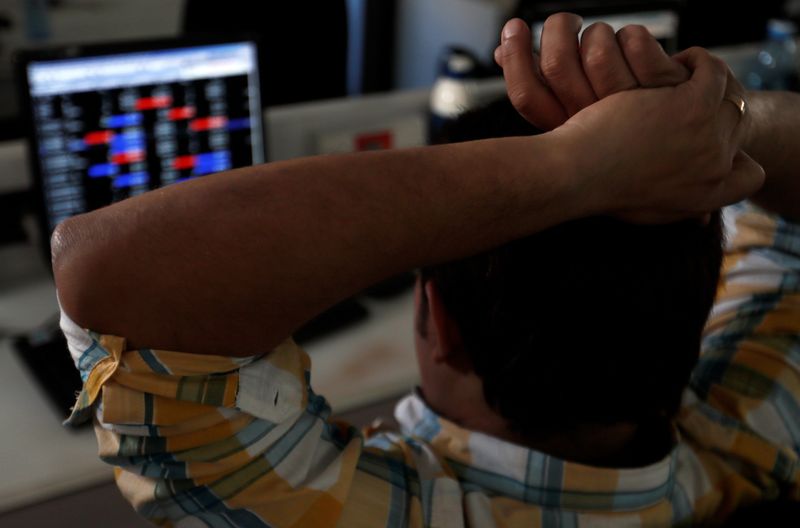 © Reuters. FILE PHOTO: A broker reacts while trading at his computer terminal at a stock brokerage firm in Mumbai, India, February 1, 2020. REUTERS/Francis Mascarenhas
2/2
© Reuters. FILE PHOTO: A broker reacts while trading at his computer terminal at a stock brokerage firm in Mumbai, India, February 1, 2020. REUTERS/Francis Mascarenhas
2/2
By Elizabeth Dilts Marshall
NEW YORK (Reuters) - World equities fell on Thursday to an 18-month-low, with markets dogged by fears high inflation would persist and force central banks to keep tightening monetary policy.
In the United States, stocks ended a whipsaw session slightly lower, as investors juggled fears of nagging inflation with signs it could be peaking. The S&P 500 came within striking distance of confirming a bear market since swooning from its all-time high reached in January.
In Europe, economic worries were exacerbated by a German warning that Russia was now using energy supplies as a "weapon."
Europe's continent-wide STOXX 600 index was down 0.75%. MSCI's gauge of stocks across the globe was down 0.69%, as of 5:09 p.m. ET (2109 GMT).
That flagship global index is nearly 20% lower for the year.
The Dow Jones Industrial Average fell 103.81 points, or 0.33%, to 31,730.3, the S&P 500 lost 5.1 points, or 0.13%, to 3,930.08 and the Nasdaq Composite added 6.73 points, or 0.06%, to 11,370.96. [.N]
The dollar climbed to a 20-year high, as global economic fears boosted its safe-haven appeal.
The dollar index rose 0.711% after touching 104.92, its highest since Dec. 12, 2002. The euro was down 0.02% to $1.0377 after falling to 1.0352, its lowest since Jan. 3, 2017.
Oil prices settled mixed on supply fears due to the pending European Union ban on Russian oil. Brent crude fell 6 cents to settle at $107.45 a barrel. WTI crude rose 42 cents, or 0.4%, to settle at $106.13.
The U.S. Labor Department said the producer price index for final demand rose 0.5% in April, slower than the 1.6% surge in March, as rising costs of energy products moderated.
Consumer price gains slowed to an 8.3% rise in April year-on-year from the 8.5% pace of March, but exceeded the 8.1% economists had forecasts.
"It has been a punishing time for financial assets since the Fed raised rates ... and the subsequent strong US jobs market, and CPI data have reinforced concerns over the extent of the task facing the Fed," analysts at ANZ bank wrote.
Graphic - World stocks suffer worst start to a year in recent record : https://fingfx.thomsonreuters.com/gfx/mkt/lgvdwgdgopo/Pasted%20image%201652345427073.png
SELL IN MAY
The main pan-Asia Pacific indexes closed down 2.5% at a 22-month low overnight. Japan's Nikkei fell 1.8. Emerging market stocks lost 2.28%.
U.S. Treasury yields slid. The yield on 10-year Treasury notes US10YT=RR was down 7.1 basis points to 2.843% after the benchmark U.S. government bond fell to a morning low of 2.816%.
Germany's 10-year yield, the benchmark for Europe, fell as much as 15 bps to 0.85%, its lowest in nearly two weeks.
The rout continued in cryptocurrency markets, with the collapse of the so-called stablecoin TerraUSD; selling in bitcoin and a 15% slump in the next-biggest-crypto, ether.nL3N2X337U]
Tether, currently the world's largest stablecoin by market cap with a value directly tied to the dollar, broke below its so-called U.S. dollar "peg." The global sell-off has now wiped more than $1 trillion off crypto markets. Around 35% of that loss has come this week.
"The collapse of the peg in TerraUSD has had some nasty and predictable spillovers. We have seen broad liquidation in BTC, ETH and most ALT coins," said Richard Usher, head of OTC trading at BCB Group, referring to other cryptocurrencies.
Precious metals also dropped. Spot gold fell 1.7% to $1,821.52 an ounce. U.S. gold futures fell 1.64% to $1,823.80 an ounce. [MET/L]
Benchmark copper on the London Metal Exchange (LME) was down 3.6% at $9,000 a ton in official trading after falling as low as $8,938. Prices are down 17% from a record high of $10,845 reached in March.

